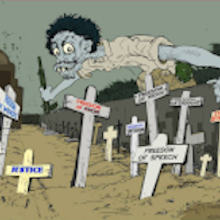
Etiopía es el país que aprendimos era místico, pues allí gobernó el legendario Prestes João das Indias, además de ser el territorio donde persiste la versión más primitiva del cristianismo, sin embargo, por su situación geopolítica ha sido un campo de múltiples batallas, sembrando miseria, horror y opresión. ¿Hay humor ahí? Por supuesto que hay humor donde hay un hombre en su sano juicio. ¿Habrá caricaturas? Descubrí que sí, algunos exiliados, otros viviendo allí, con todas las dificultades inherentes a la opresión. Me comuniqué con varios pero ninguno respondió y si escribo esta crónica es con registros de entrevistas encontradas en internet.
En primer lugar, vale la pena remontarse a principios del siglo XIX para conocer a Aleqa Gebre Hanna, natural de Fogera Woreda - Nabega Giorgis (1821) que desde muy joven se hizo famoso por sus bromas y su espíritu satírico. Al servicio de la iglesia copta, sus discursos satíricos y humorísticos acabaron acercándole al emperador Menelik II y a su esposa, la emperatriz Taytu. Su fuerza humorística residía en su dominio del idioma «amárico», que se presta a muchos juegos de palabras, ya que sus verbos tienen interpretaciones dobles y triples, lo que requiere una gran concentración a la hora de contextualizar las palabras. Así que quien domina el ingenio del “sowaso” (la gramática del idioma amárico) manipula mejor el humor. De esta manera, Aleqa se destacó y dejó en la tradición cientos de historias cómicas, convirtiéndose en un símbolo del humor etíope que aún hoy es popular.
Volviendo al presente. Soy amigo en Facebook del artista Yemsrach Yetneberk y Roman Tadesse que viven en el país pero han estado posponiendo sus respuestas, tal vez por miedo. Alemayehu “Alex” Tefera, que vive en Reino Unido y retrata lo que pasa en su país, envió enlaces a entrevistas que ya había concedido: «Sólo cojo el lápiz para los hechos que me afectan. Intento que mis dibujos capturen una verdadera experiencia emocional. Esto significa que no siempre describo lo que sucede en la política etíope.
Cuando dibujo, no es para ofender a la gente ni para hacer feliz a nadie. Mis obras son mi mundo donde me comunico con mis pensamientos íntimos. Sin embargo, en sociedades como la nuestra, las caricaturas pueden ser etiquetadas como insultantes o abusivas. Como caricaturista político, todos los sentimientos inspirados por la interacción cotidiana de la sociedad son los componentes esenciales que utilizo, no sólo para enmarcar el concepto de la historia, sino también para darle sabor a los dibujos.
Nosotros, los etíopes, tenemos una historia rica y diversa, pero no hemos logrado moldear a la próxima generación a través de nuestras propias historias, refranes y literatura oral. Los cómics y los cartoons podrían ser una forma poderosa de enseñar moral e historia a los niños. Los profesionales etíopes de todos los campos necesitan colaborar e invertir para crear una Etiopía mejor».
Actualmente el ambiente político ya no es tan tenso, abriéndose algunas ventanas de libertad pero…
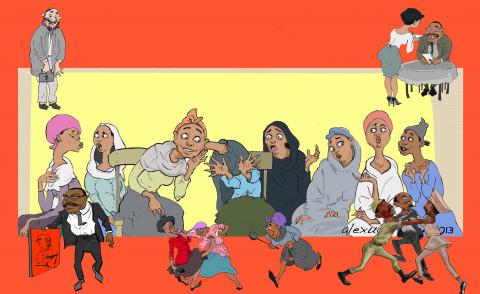
Alex Tefera
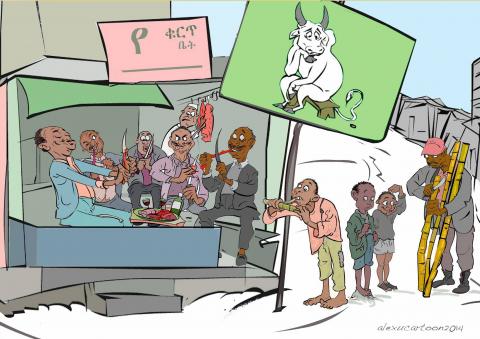
Alex Tefera
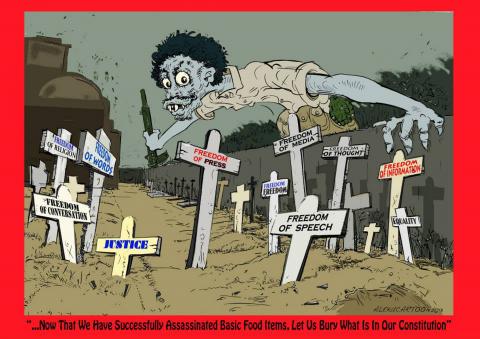
Alex Tefera
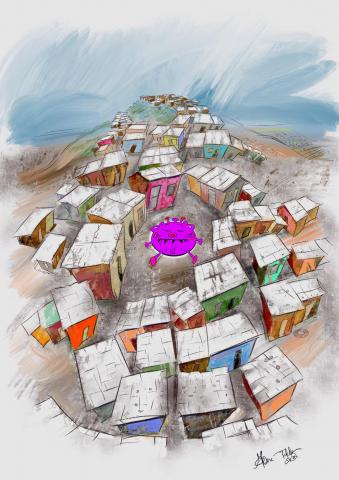
Alex Tefera
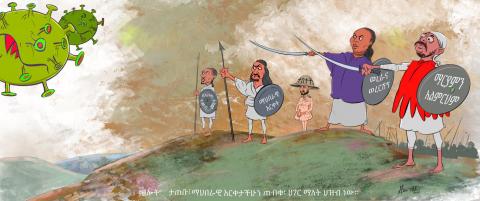
Alex Tefera
Humors of the world – Ethiopia
By: Osvaldo Macedo de Sousa
Ethiopia is the country that we learned was mystical, because the legendary Prestes João das Indias ruled there, in addition to being the territory where the most primitive version of Christianity persists, however, due to its geopolitical situation it has been a field of multiple battles, sowing misery , horror and oppression. Is there humor there? Of course there is humor where there is a sane man. Will there be cartoons? I discovered that yes, some exiled, others living there, with all the difficulties inherent to oppression. I contacted several but none responded and if I write this chronicle it is with records of interviews found on the internet.
First of all, it is worth going back to the beginning of the 19th century to meet Aleqa Gebre Hanna, a native of Fogera Woreda - Nabega Giorgis (1821) who from a very young age became famous for his jokes and satirical spirit. In the service of the Coptic church, his satirical and humorous speeches ended up bringing him closer to Emperor Menelik II and his wife, Empress Taytu. His humorous strength lay in his mastery of the «amharic» language, which lends itself to many word games, since its verbs have double and triple interpretations, which requires great concentration when contextualizing the words. So whoever masters the ingenuity of “sowaso” (the grammar of the Amharic language) manipulates humor better. In this way, Aleqa stood out and left hundreds of comic stories in the tradition, becoming a symbol of Ethiopian humor that is still popular today.
Returning to the present. I am friends on Facebook with the artist Yemsrach Yetneberk and Roman Tadesse who live in the country but have been postponing their responses, perhaps out of fear. Alemayehu “Alex” Tefera, who lives in the United Kingdom and portrays what is happening in his country, sent links to interviews he had already given: «I only pick up the pencil for the events that affect me. I try to make my drawings capture a true emotional experience. This means that I don't always describe what is happening in Ethiopian politics.
When I draw, it's not to offend people or to make someone happy. My works are my world where I communicate with my intimate thoughts. However, for societies like ours, cartoons can be labeled as insulting or abusive. As a political cartoonist, all the feelings inspired by the day-to-day interaction of society are the essential components I use, not only to frame the concept of the story, but also to flavor the drawings.
We Ethiopians have a rich and diverse history, but we have failed to shape the next generation through our own stories, proverbs and oral literature. Comics and cartoonism could be a powerful way to teach morals and history to children. Ethiopian professionals from all fields need to collaborate and invest to create a better Ethiopia».
Currently the political environment is no longer so tense, with some windows of freedom opening but…
(This text has been translated into English by Google Translate)
